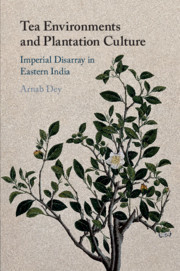Description
Tea Environments and Plantation Culture
Imperial Disarray in Eastern India
Author: Dey Arnab
Rethinks the tea plantation economy of colonial east India by highlighting its human and non-human networks and practices.
Language: English
Subject for Tea Environments and Plantation Culture:
Approximative price 30.28 €
In Print (Delivery period: 14 days).
Add to cart
Tea Environments and Plantation Culture
Publication date: 06-2021
Support: Print on demand
Publication date: 06-2021
Support: Print on demand
Tea Environments and Plantation Culture
Publication date: 12-2018
250 p. · 15.8x23.5 cm · Hardback
Publication date: 12-2018
250 p. · 15.8x23.5 cm · Hardback
Description
/li>Contents
/li>Biography
/li>
Arnab Dey examines the intersecting role of law, ecology, and agronomy in shaping the history of tea and its plantations in British east India. He suggests that looking afresh at the legal, environmental, and agro-economic aspects of tea production illuminate covert, expedient, and often illegal administrative and commercial dealings that had an immediate and long-term human and environmental impact on the region. Critiquing this imperial commodity's advertised mandate of agrarian modernization in colonial India, Dey points to numerous tea pests, disease ecologies, felled forests, harsh working conditions, wage manipulation, and political resistance as examples of tea's unseemly legacy in the subcontinent. Dey draws together the plant and the plantation in highlighting the ironies of the tea economy and its consequences for the agrarian history of eastern India.
Introduction; 1. Planting empires; 2. Agriculture or manufacture?; 3. Bugs in the garden; 4. Death in the fields; 5. Conservation or commerce?; 6. Plant and politics; Conclusion.
Arnab Dey is Assistant Professor of Modern Indian History at the State University of New York at Binghamton. His research interests span the fields of labor, political economy, law, and environmental history. He has held fellowships from the Andrew W. Mellon Foundation, the Nicholson Center for British Studies at the University of Chicago, and the Rachel Carson Center for Environment and Society in Munich.
© 2024 LAVOISIER S.A.S.
These books may interest you

The Tea Industry in IndiaA Review of Finance and Labour, and a Guide for Capitalists and Assistants 31.44 €

Chinese Tea 21.43 €


